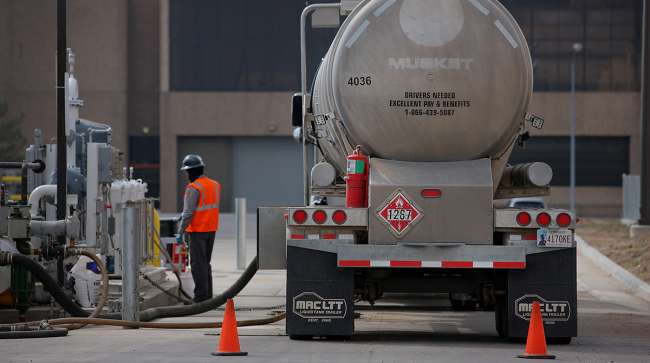Senior Reporter
Diesel Jumps 3.8¢ to $3.010 a Gallon

The U.S. average retail price of diesel rose 3.8 cents to $3.010 as the potential for conflict in the Middle East rose, lifting the price of crude above $65.
It was the first increase in the average price of diesel after six consecutive declines that saw the price per gallon drop by 11.4 cents since Feb. 5. Diesel cleared the $3 threshold for the first time since Feb. 26 when it was $3.007, according to the Department of Energy.
Trucking’s main fuel costs 47.8 cents a gallon more than it did a year ago, when the price was $2.532.
The average price of diesel rose in all regions.
Meanwhile, the national average price for regular gasoline rose 5 cents to $2.648 a gallon, DOE’s Energy Information Administration said. The average is 33.3 cents higher than it was a year ago. Prices rose in all regions, too.
A barrel of oil contains 42 gallons, so each dollar of change in the price of oil results in about a 2.4-cent-per-gallon change in the price of petroleum products such as heating oil or diesel, assuming no change in other price components, such as refinery margins or taxes, according to EIA.
U.S. on-highway diesel prices for 2017-18 have been climbing since last summer, compared with 2016-17 prices in the same periods, EIA reported.
Managing the cost of diesel fuel is not limited to fleets. Digital freight brokers offering services through apps are focused on it.
Uber Freight, now operating in the lower 48 states after beginning in Texas, offers a branded fuel card through Comdata either as a pre-funded or credit card and refers to fuel as the most expensive part of a driver’s life on the road.
The card, part of its Uber Freight Plus program, provides a 20-cent-per-gallon discount off retail prices tor small fleets and owner-operators purchasing fuel at TA and Petro stopping centers, Eric Berdinis, senior product manager at Uber Freight, told Transport Topics.
TA and Petro are brands of parent company TravelCenters of America.
Discount fuel through the program is also available at Roady’s Truck Stops.
“Because Uber Freight works with lots and lots of small carriers, we can aggregate them kind of like a virtual fleet and drive business just like [truck stops] would drive business to the Uber Freight product,” Berdinis said.
To become eligible for the card, a carrier must have booked and completed at least one load on the Uber Freight app. To remain eligible, a carrier must book and complete at least one load every 30 days.
Those participating in Uber Freight Plus can also save on certain truck purchases, maintenance, Goodyear tires and receive discounts on IFTA licensing and permits, according to Uber Freight.
Digital freight broker Convoy, which has evolved from local West Coast shipments to a national operation, offers tire discounts and roadside service through Goodyear, too.
“Convoy is in several conversations now. A fuel card is absolutely a benefit we are looking into,” said Kristen Forecki, Convoy’s vice president of operations.
“We will continue to look for partnership opportunities like the Goodyear partnership to lower costs for carriers down the road. And make sure [drivers] have access to app tools to do their job,” she said.
At the same time, Convoy can increase fuel efficiency by minimizing empty miles, she added.
Also, U.S. refineries produced more gasoline the week ending March 23, averaging over 10.3 million barrels per day. Production of distillate fuel — primarily ultra-low-sulfur diesel used in transportation and to a lesser degree as heating oil — increased, averaging more than 4.8 million barrels per day, according to EIA.
West Texas Intermediate crude futures on NYMEX closed at $65.55 per barrel March 26 compared with $62.06 on March 19.
“A lot of geopolitical tensions got priced into the market last week,” John Kilduff, a partner at Again Capital LLC, a New York-based hedge fund, told Bloomberg News March 26.
Prices slipped March 28 as EIA reported U.S. crude inventories rose by 1.64 million barrels, which was almost double the median estimate in a Bloomberg News survey.
Saudi Arabia successfully defended its oil fields from a missile attack and President Donald Trump appointed foreign policy hawk John Bolton as his latest national security adviser, a move that signaled the United States may take a harder line on Iran, a key oil-producing country.
In addition, China began trading its first crude-futures contract on March 26 as the world’s biggest oil buyer seeks greater power over pricing to challenge benchmarks in the United States and Europe, according to Bloomberg.




